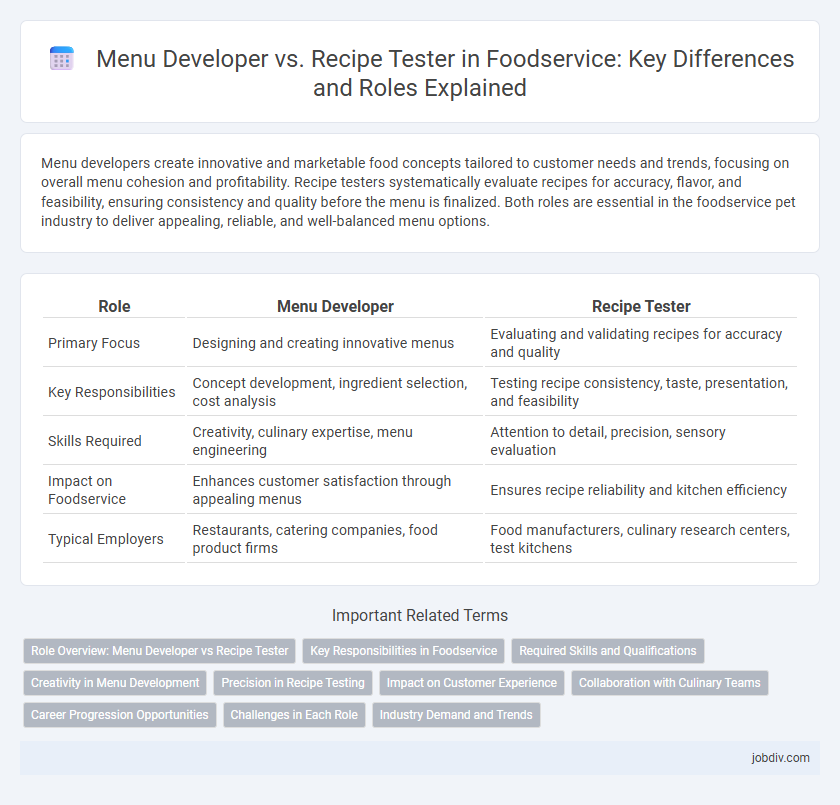Menu developers create innovative and marketable food concepts tailored to customer needs and trends, focusing on overall menu cohesion and profitability. Recipe testers systematically evaluate recipes for accuracy, flavor, and feasibility, ensuring consistency and quality before the menu is finalized. Both roles are essential in the foodservice pet industry to deliver appealing, reliable, and well-balanced menu options.
Table of Comparison
| Role | Menu Developer | Recipe Tester |
|---|---|---|
| Primary Focus | Designing and creating innovative menus | Evaluating and validating recipes for accuracy and quality |
| Key Responsibilities | Concept development, ingredient selection, cost analysis | Testing recipe consistency, taste, presentation, and feasibility |
| Skills Required | Creativity, culinary expertise, menu engineering | Attention to detail, precision, sensory evaluation |
| Impact on Foodservice | Enhances customer satisfaction through appealing menus | Ensures recipe reliability and kitchen efficiency |
| Typical Employers | Restaurants, catering companies, food product firms | Food manufacturers, culinary research centers, test kitchens |
Role Overview: Menu Developer vs Recipe Tester
Menu developers design innovative food concepts, curate balanced dishes, and strategize menus to align with target consumer preferences and business goals. Recipe testers rigorously evaluate recipes for accuracy, consistency, and taste, ensuring instructions produce reliable results in diverse kitchen settings. Both roles are essential in creating successful foodservice offerings, with menu developers driving creativity and recipe testers guaranteeing execution quality.
Key Responsibilities in Foodservice
Menu Developers design and curate foodservice menus by analyzing customer preferences, nutritional requirements, and food trends to create appealing and cost-effective offerings. Recipe Testers focus on validating recipes through rigorous trials, ensuring consistency, taste, and quality standards are met before final implementation in foodservice operations. Both roles collaborate to optimize menu performance, enhance customer satisfaction, and maintain operational efficiency.
Required Skills and Qualifications
Menu developers require strong culinary expertise, creativity in dish creation, and knowledge of food trends, along with skills in cost analysis and nutritional planning. Recipe testers focus on precision, attention to detail, and consistency, ensuring recipes produce reliable results, requiring strong understanding of food science and cooking techniques. Both roles demand excellent communication skills and the ability to collaborate with kitchen staff and suppliers.
Creativity in Menu Development
Menu developers harness creativity to design innovative dishes that align with current food trends and customer preferences, crafting menus that enhance brand identity and profitability. Recipe testers focus on evaluating and refining these creations to ensure consistency, flavor balance, and feasibility within kitchen operations. Both roles are essential, but the menu developer drives creative concept ideation while the recipe tester ensures practical execution.
Precision in Recipe Testing
Menu developers strategically design and innovate dishes to align with brand identity and customer preferences, while recipe testers ensure each recipe's precision by executing multiple trials to verify consistency and flavor balance. Precision in recipe testing is crucial for maintaining quality control, as testers rigorously measure ingredient proportions and cooking techniques to replicate exact results. This process supports menu developers by providing reliable, standardized recipes that meet both operational efficiency and customer satisfaction.
Impact on Customer Experience
Menu developers design innovative and balanced menus that cater to target customer preferences, enhancing overall dining satisfaction. Recipe testers validate and refine dishes to ensure consistency, taste, and quality before reaching the customer. Their combined efforts significantly improve the reliability and appeal of the foodservice offerings, directly impacting customer experience and loyalty.
Collaboration with Culinary Teams
Menu Developers collaborate closely with culinary teams to craft innovative, market-driven dishes that align with brand identity and customer preferences. Recipe Testers work alongside chefs and food scientists to validate recipe accuracy, ensuring consistency in flavor, presentation, and portion control across all service points. Their combined efforts facilitate seamless menu rollout and uphold quality standards in foodservice operations.
Career Progression Opportunities
Menu developers often advance into executive roles such as food service directors or culinary managers, utilizing skills in concept creation and market trends analysis. Recipe testers typically progress into roles like quality assurance specialists or culinary researchers, focusing on precision and consistency in food preparation. Career growth for menu developers emphasizes creativity and leadership, while recipe testers gain expertise in food science and operational standards.
Challenges in Each Role
Menu developers face challenges in balancing creativity with cost-efficiency and dietary trends to create appealing yet profitable menus. Recipe testers struggle with ensuring consistency, accuracy, and replicability of dishes across different kitchens under varied conditions. Both roles require meticulous attention to detail but differ in their focus on innovation versus execution.
Industry Demand and Trends
Menu Developers are in high demand due to their expertise in creating innovative, consumer-driven menus that align with current food trends such as plant-based items and sustainable sourcing. Recipe Testers support this process by ensuring accuracy, consistency, and quality, which is critical as foodservice providers adapt to increased consumer expectations for flavor and nutrition. Both roles are growing as the industry prioritizes efficiency, menu personalization, and regulatory compliance.
Menu Developer vs Recipe Tester Infographic

 jobdiv.com
jobdiv.com